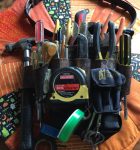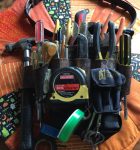The Handyman’s Tool Pouch, by John M.

Over
the
decades,
I
became
a
seasoned
(older)
person
having
built,
renovated
a
few
homes,
rebuilt
a
score
of
autos,
maintained
survival
retreats,
watercraft,
motorcycles,
and
so
forth.
These
all
at
some
point
require
specific
tools,
be
it
just
a
screwdriver,
or
a
Crescent
wrench.
Chances
are,
working
at
a
building
site,
or
other
situation
you
will
have
most
tools
that
you
need,
but
there
is
that
unplanned
event
that
requires
a
special
tool.
When
I
was
younger,
my
goal
was
to
have
tools,
lots
of
tools,
and
soon
discovered
the
need
for
storage
and
a
large
tool
chest
on
wheels
was
the
logical
solution.
That
worked
for
organizing
tools
but
was
not
always
convenient
and
sometimes
required
several
trips
back
and
forth
to
the
tool
chest.
Today,
I
still
have
a
large
chest
on
wheels
in
my
workshop,
and
it
has
served
me
well
for
use
in
the
shop.
But
over
the
years,
different
off-sire
jobs
dictated
the
need
for
a
hand-carry
toolbox.
So
I
created
a
toolbox
for
electrical
jobs,
another
for
carpenter’s
needs,
and
still
another
for
plumbing
use.
In
the
1970s
I
added
a
tool
pouch,
which
was
the
type
that
roofers
use,
and
it
served
me
well
until
I
discovered
the
electrical
type
pouch.
This
was
the
one
made
for
General
Electric,
for
their
electrical
workers.
This
discovery
was
a
“Kodak
moment”
that
I
had
while
working
remote
projects.
There,
Iearned
about
not
having
the
right
tool
for
the
job
bigger
screwdriver,
or
maybe
a
pair
of
pliers,
a
level,
etc.
The
frustration
of
having
to
stop
what
I
was
working
with
or
on
and
go
back
and
find
the
tool
I
needed
was
time-consuming
and
interruptions
in
my
thought
process
and
workflow.
 During
During
the
1980s
also
I
discovered
my
love
for
survival
prepping.
As
I
researched,
I
decided
what
items
and
quantities
I
wanted
for
any
potential
scenarios.
In
addition
to
those
items,
I
realized
the
requirement
for
a
small
set
of
basic
tools
was
needed,
keyword
basic,
and
also
how
to
transport
them.
A
hand-carry
toolbox
was
not
the
ideal
solution
as
I
wanted
and
needed
to
limit
size
and
weight
and
most
importantly
I
wanted
to
be
able
to
see
what
I
had
available.
Needed
general-purpose
tools
easy
to
transport
and
provide
a
wide
spectrum
of
needs
in
most
given
situations.
I
settled
on
the
electrical
tool
pouch
or
now
as
I
call
it
the
“bug
out
tool
pouch”,
with
knowledge
from
my
years
of
doing
many
things,
what
basic
tools
would
work
for
me
and
still
be
easy
to
transport.
The
pouch
size
provides
a
decent
amount
of
space
and
limits
those
selections
of
tools
that
I
want.
I
do
not
use
the
pouch
to
mount
on
my
pants
belt.
Instead,
I
prefer
to
use
it
as
a
shoulder
carry
bag
which
distributes
the
weight
and
makes
it
easy
to
load
or
unload.
The
items
I
have
on
the
shoulder-carried
pouch
include:
Claw
hammer,
tape
measure,
6
Phillip
and
flat
blade
screwdrivers
of
different
sizes,
electrical
tape,
silicone
tape,
small
level,
tile
knife,
scissors,
6”
carpenters
pry
bar,
channel
locks,
pliers,
awl,
flashlight,
needle
nose
pliers,
6”
&
8”
Crescent
wrenches,
large
wire
cutter,
battery
pliers,
6”
keyhole
saw,
black
marker,
pencil,
2”
wood
chisel,
6”
steel
ruler,
6
tie
wraps,
putty
knife,
expanding
12”
magnet
retriever,
and
two
paint
can
keys.
Also,
you
will
notice
in
the
picture
a
round
green
repurposed
mints
box.
In
that,
I
carry
a
few
screws
and
nails.
The
pouch
with
tools
weighs
in
at
about
15
pounds,
and
the
pouch
in
the
picture
is
about
40
years
young
and
still
very
serviceable.
